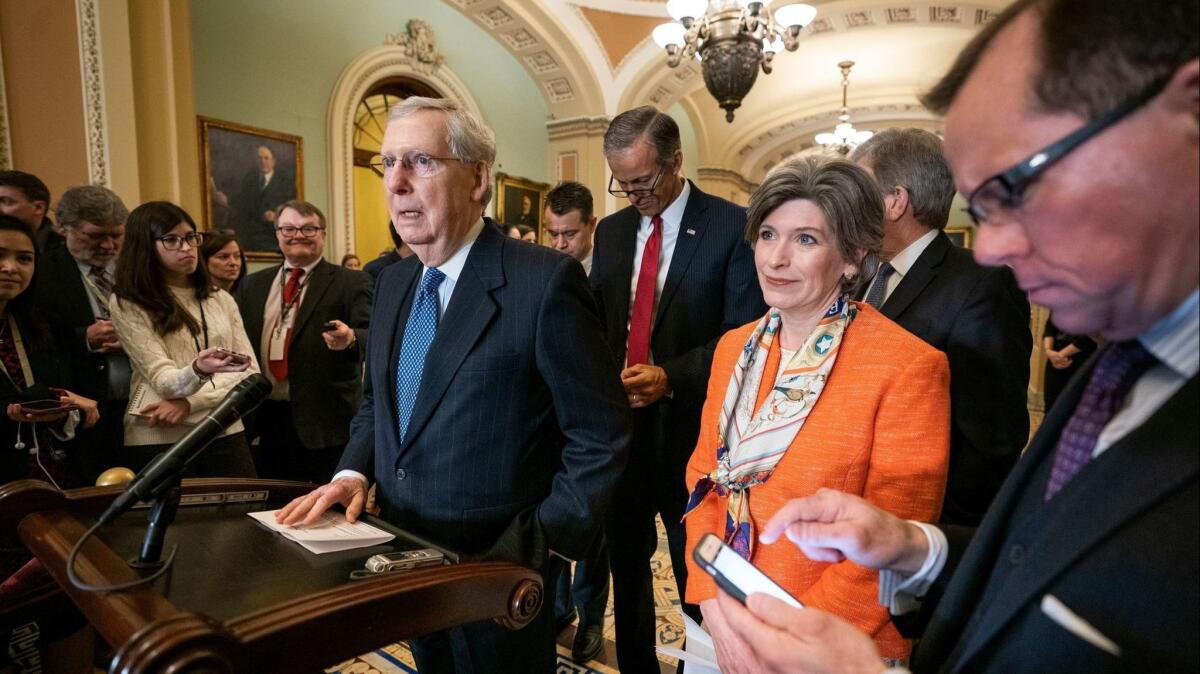The Senate rebuked Trump’s ‘emergency’ border wall, just not strongly enough

The Senate gave final approval Thursday morning to a House-passed resolution to end the state of emergency declared by President Trump in order to steer billions of additional tax dollars to his pet project, a bigger, more extensive wall along the U.S.-Mexico border. It’s the second rebuke to Trump in two days — the body voted Wednesday to cut off U.S. aid to Saudi Arabia for the war against Yemeni rebels. But there does not appear to be enough GOP support for the wall resolution to overcome a certain Trump veto.
That’s because of members like Sen. James Lankford (R-Okla.), who either do not recognize the principle at stake or do not care about it.
The resolution passed, 59-41, with 12 Republicans joining all the chamber’s Democrats and independents in support. That’s well short of the two-thirds majority it would take (in both chambers) to override a veto.
Lankford took to the floor for several minutes Thursday to support Trump’s argument that the situation at the border was an emergency. He made a much better case than Trump had, focusing on the amount of illegal drugs that U.S. Customs and Border Protection has seized on its way into the United States between official ports of entry in Texas.
Enter the Fray: First takes on the news of the minute »
With deaths from opioid overdoses rising sharply in this country, it makes sense to try harder to stem the flow of illegal drugs — even if the vast bulk of them arrive through official points of entry, tunnels and other means not impeded by a border wall. And according to Lankford, Trump is simply seeking to put barriers on what Customs and Border Protection says are “the 10 highest drug-trafficking corridors in all of the southern border.”
But here’s the thing: The administration made that case to Congress, and lawmakers chose not to give him the full $5.7 billion he was seeking for the wall. Instead, they put up a little less than $1.4 billion.
That’s how the process works. Administrations throughout history have gone to Congress, hat in hand, and asked for money to fund a slew of priorities. They get much of what they ask for, and what they don’t get, they either drop or try again the next year.
Rather than respect Congress’ constitutional power over the federal purse, Trump decided to flout it. He used his statutory power to declare a state of emergency, unlocking emergency powers that were intended for addressing problems that were so fast-moving or unpredictable that Congress could not address them in time. Then he used one of those powers to shift $3.6 billion from previously appropriated military construction projects to his wall — in other words, to overrule Congress and write himself a check.
It’s worth noting that, separate from the emergency declaration, Trump used the reprogramming authority Congress gave him to shift billions of dollars to the wall project. According to Lankford, the $3.6 billion won’t even be tapped until next fiscal year — after Congress considers another round of spending bills.
One of Lankford’s more senior colleagues, Lamar Alexander (R-Tenn.), ably laid out the issue in a statement announcing his support for the resolution ending the emergency declaration.
“I support the president on border security,” Alexander said. “I have urged him to build the 234 miles of border wall he has asked for in the fastest possible way by using $5.7 billion already approved by Congress. But his declaration to take an additional $3.6 billion that Congress has appropriated for military hospitals, barracks and schools is inconsistent with the U.S. Constitution that I swore an oath to support and defend.
“Never before has a president asked for funding, Congress has not provided it, and the president then has used the National Emergencies Act of 1976 to spend the money anyway. The problem with this is that after a Revolutionary War against a king, our nation’s founders gave to Congress the power to approve all spending so that the president would not have too much power. This check on the executive is a crucial source of our freedom.
“This declaration is a dangerous precedent. Already, Democrat presidential candidates are saying they would declare emergencies to tear down the existing border wall, take away guns, stop oil exports, shut down offshore drilling and other leftwing enterprises—all without the approval of Congress.”
Yup.
Sadly, Republicans already appeared to be backing down from that principle to maintain their bona fides with Trump supporters back home, who are more swayed by Trump’s fearmongering about border security than by concerns about the constitutional separation of powers.
A good example is North Carolina’s Thom Tillis, an early supporter of the resolution who announced minutes before the vote that he had flip-flopped. Why? Because the president said “he’s willing to work with us” to narrow the White House’s power to declare emergencies.
That’s the compromise Senate Majority Leader Mitch McConnell (R-Ky.) is floating, even though Trump was refusing to support it as recently as Wednesday. And it’s, ahem, irrelevant to the situation at hand.
If I misappropriated your money but promised to talk about giving you less access to your bank account in the future, would you let me keep your money? Of course not. But Republicans are eager to find a way to give Trump and the party a win on border security without appearing to open the door for the next president to commit a similar crime against the Constitution.
Note to Republicans in Congress: No matter how narrow a definition of an emergency you write, presidents will find a way to fit the facts to the definition. And besides, the issue here isn’t whether there are big problems at the border. The issue is that Congress considered them and decided not to address them the way Trump wanted, so he used emergency powers to reverse that decision. That’s the precedent being set here, and it’s one Congress ignores at its peril.
More to Read
A cure for the common opinion
Get thought-provoking perspectives with our weekly newsletter.
You may occasionally receive promotional content from the Los Angeles Times.











